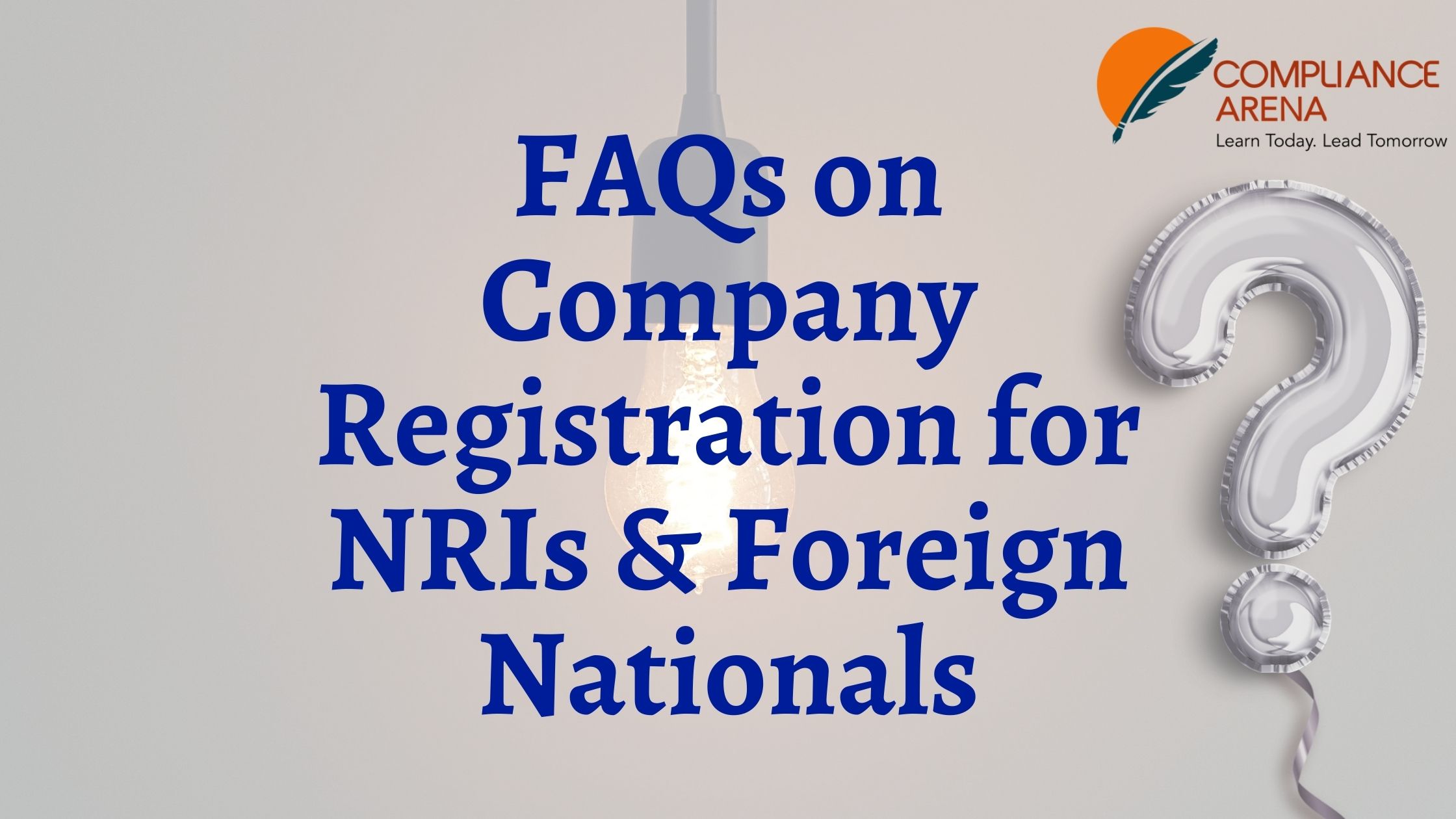by CS Arpit Garg
There are multiple options for NRIs and Foreign Nationals to register a company in India for the business purpose. Foreign Subsidiary, Wholly Owned Subsidiary are one of the options and other are through setting joint ventures in India.
Setting up business in India is a tedious task which involves a chain of paper work. Today we will discuss all the FAQ’s on Company Registration for NRIs and Foreign Nationals.
Q1– What are the entry routes of a foreign Company planning to do business in India?
A Foreign Company planning to invest in India can do so through
- Through establishing a Joint Venture
- Through establishing a wholly owned Subsidiary.
The term subsidiary means a there should be either a private limited company or a public limited and at least 51% of its entire equity capital should be held by some other Indian or foreign company.
Q2. What is an Indian Subsidiary of a foreign Company?
A Foreign Company can invest in India by forming an Indian Subsidiary. An Indian Subsidiary would be a private limited company in which the foreign company would be controlling the majority of Board of Directors of the Indian Company or would exercise control of more than half of the total voting power.
Q3. How many directors are required to set up a private limited Company?
A private limited Company must have a minimum of two Directors and can have maximum of fifteen directors.
Q4. What do u mean by DIN?
DIN refers to Director Identification Number which is a unique identification number allotted to every director. DIN can be allotted after the incorporation of the Company or else after incorporation if a person wants to be a director in any company.
Q5- What do u mean by DSC?
DSC refers to Digital Signature Certificate which an electronic signature to be used for filing of Forms and other documents in India and for various purposes. Every Director can have one DSC and they all have an expiry date after which they have to be renewed.
Q6- How many shareholders are required to set up a private limited Company?
A Private limited Company must have a minimum of two members (shareholders) and a maximum of fifteen members.
Q-7 Can a Foreign Company or a Foreign Corporation hold shares of a Private Limited Company?
Yes, Foreign Companies can hold shares of a Private Limited Company in India subject to Foreign Direct Investment (FDI) Guidelines.
Q8. What are the qualifications to be a Director in an Indian Company? Can a foreign national be a director in Indian Company?
The Directors needs to be a person and He/ She should be more than 18 years old. A foreign national can be a director in the Indian Subsidiary. A foreign subsidiary in India should have atleast one resident director.
Q9. Is it mandatory to allot shares to the Indian Director?
It is not mandatory to allot shares to the Indian director
Q10. How long will it take to incorporate an Indian Subsidiary?
As a measure of Ease of doing business in India. Now the Companies can be incorporated in less than a week’s time.
Q11. Do we need to be present in person to incorporate the Company in India?
No, There is no need to be physically present in India. As all the requirements can be met electronically
Q12 What are requirements for having registered address in India?
An address in India where the registered office of the Company will be situated is required. Although the documents for the address can be given upto thirty days from the incorporation of the Company.The premises can be a commercial / industrial / residential where communication from the MCA will be received.
Q13– What would be criteria for selecting the name of the Indian Subsidiary?
In case of Subsidiary or wholly owned subsidiary of the Company, a foreign Company can use the coin word for incorporation of the Company in India
For e.g. If a foreign company has its name as XYZ Limited, then the Indian Subsidiaries name can be XYZ India Private Limited
The foreign Company can also choose any name of its own choice also.
Q14- What are the mandatory proofs that are required by foreign director to incorporate a subsidiary Company in India.
- Identity Proof i.e Passport of the proposed Director
- Address proof is mandatory for all the proposed Directors of the Company which includes your electricity/mobile/telephone/Bank statement etc which should not be older than two months.
- A Photograph
Q15- What are the mandatory proofs that are required by an Indian director to incorporate a subsidiary Company in India
The Mandatory proofs that are required by an Indian director to incorporate a subsidiary Company in India are as follows :-
- PAN Card is mandatory for Indian Nationals
- Address proof is mandatory for all the proposed Directors of the Company which includes your electricity/mobile/telephone/Bank statement etc which should not be older than two months.
- Identity Proof would include Voter id , Driving License or Aadhar of the Indian Nation
Q16- Do I need to notarize or apostille or consularize any of the documents?
The notarization and apositalisation depends on the country of origin. Where the Subscriber To memorandum is a foreign national residing outside India and
- In a country in any part of the Commonwealth, his signatures and address on the memorandum and articles of association and proof of identity shall be notarized by a Notary (Public) in that part of the Commonwealth
Or
- (b) in a country which is a party to the Hague Apostille Convention, 1961, his signatures and address on the memorandum and articles of association and proof of identity shall be notarized before the Notary (Public) of the country of his origin and be duly apostillised in accordance with the said Hague Convention.
- (c) in a country outside the Commonwealth and which is not a party to the Hague Apostille Convention, 1961, his signatures and address on the memorandum and articles of association and proof of identity, shall be notarized before the Notary (Public) of such country and the certificate of the Notary (Public) shall be authenticated by a Diplomatic or Consular Officer empowered in this behalf under section 3 of the Diplomatic and Consular Officers (Oaths and Fees) Act, 1948 (40 of 1948) or, where there is no such officer by any of the officials mentioned in section 6 of the Commissioners of Oaths Act, 1889 (52 and 53 Vic.C.10), or in any Act amending the same
Or
- (d) if the subscriber has visited in India and intended to incorporate a company, in such case the incorporation shall be allowed if, he/she is having a valid Business Visa.
Q17- What are Article of Association and Memorandum of Association of the Company?
The main constitutional document of an Indian company is its Memorandum of Association and Articles of Association. The Memorandum of Association contains the objectives of the company and details of Company’s promoters and their ownership in the company and also their liability in case of liquidation. The Articles of Association is also very crucial piece of document and it contains the rights, duties, obligations of promoters and directors. It defines working relationship of company with its promoters and directors. The company’s Memorandum of Association and Articles of Association has be very carefully drafted as a company cannot go beyond the provisions of its Memorandum and Articles of Association.
Q-18 What is the capital required to start an Indian Subsidiary Company?
There is no requirement to have minimum paid-up share capital and therefore, paid-up share capital can be as low as INR. 1/-. The authorised share capital or nominal capital is maximum limit of share capital, a company can issue shares. Presently there is no incorporation fee for keeping the authorised share capital upto INR. 1 Lakh and only stamp duty has to be paid on authorised share capital. It is advisable to keep the authorised capital INR. 1 lakh at the beginning. The company’s authorised capital may be increased at later stage after incorporation as per the requirements of capital.
Q-19 What are the PAN and TAN of the Company and when are they allotted?
The PAN is the Permanent Account Number and is mandatory for every company to it so as to open a bank account in its own name
The Tax Deduction Account Number or Tax Collection Account Number – is a ten-digit alphanumeric number issued by government agency Income Tax Department. TAN is to be obtained by individuals responsible for deducting tax at source (TDS) or collecting tax at source (TCS).
Q20- What are FDI Guidelines for Foreigners in a Private Limited Company.
100% Foreign Direct Investment is allowed in India in many of the industries under the Automatic Route. There are called RBI Approvals – if the percentage allowed for various Sectors is met. However, an application for approval is required for automatic approvals.
Special Permission – FIPB Approvals – could be obtained to invest over and above the regular percentage allowed for various Sectors.
Q21 How long is the registration of the Company valid for?
Once a Company is incorporated; it will be active and in-existence as long as the annual compliances are met with regularly. In case, annual compliances are not complied with, the Company will become a Dormant Company and maybe struck off from the register after a period of time. A struck-off Company can be revived for a period of up to 20 years.
For any queries contact
CS Arpit Garg
Practicing Company Secretary & Founder- Compliance Arena
8447773833
info@compliancearena.in












